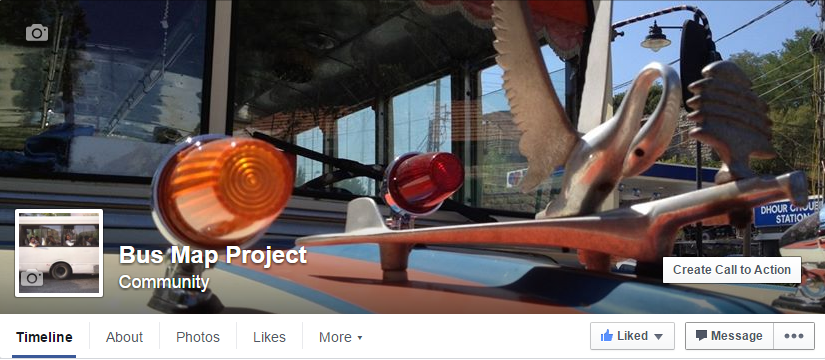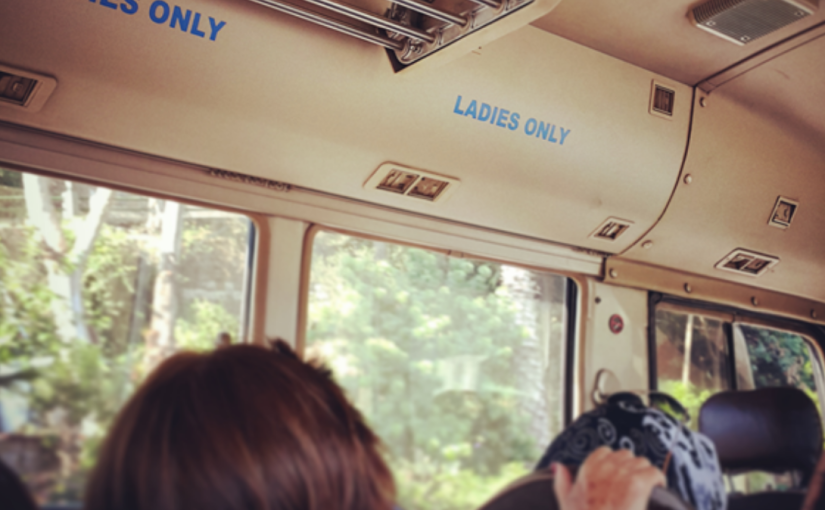Today’s #HerBus story is troubling and bleak, and some of the conclusions it draws are controversial. While it is not a first-hand account, we thank Lynn for sharing her thoughts and reflections on the experiences of Lebanese women on public transport, because the fear of violence and exploitation that she expresses is real and pervasive. Scroll down to read our translation of Lynn’s story.
* * *
لطالما كنّا ندرك سابقاً ان الامن اللبناني غائب عن الساحة المحليّة، وقد تسبب هذا الغياب بتفشّي ظاهرة خطف المواطنين من امام مسكنهم او حتى خطف القاصرات من خارج المدارس في بعض المناطق كما بات معلوماً في الآونة الاخيرة
هنا سأسرد واقعة حصلت مع رفيقتي حيث أخبرتني اذ انّها كانت في أحد الأيام بإنتظار باص ليقلّها من جسر الكولا الى جونية حيث اعترضها شابان وبدءا يتحرشا بها لفظيّاً ويٌسمعاها كلام بذيئاً. وعندما تحاول كل فتاة الوقوف بقرب رجل الأمن يلحق بها من كان يضايقها غيرآبهين لوجوده. ويصل الباص وهنا الخطورة الكبيرة حيث تكون هذه الشابة الانثى الوحيدة في خضمّ مجموعة ذكور ينهالون عليها بالنظرات وكأنها حوريّة في بحرالعسل فتعيش الشابة حينئذٍ ليس فقط خوف داخلي انّما رعب شديد من هؤلاء. وما تلبث رحلة الوصول الى المنزل بالانقضاء يحاصرالفتاة رجلين او ثلاث ويحاولون الاعتداء عليها لفظيّاً علماً ان السائق لا يفتح فاهه لربما اعتاد على هذا النمط من الالتماس او انّه يفضّل تجنّب التورّط معهم
يتحوّل الباص من الساعة الواحدة ظهراً حتّى التاسعة مساءً الى شريعة غاب تسود قوّة الرجال داخل حافلات النقل العام وما من رقيب ولاحسيب. تعيش الفتاة اللبنانية اثناء تنقّلها ذعراً لا مثيل له، مما ينعكس سلباً على حياتها النفسيّة اولاً وتفقد ثقتها وعزّة نفسها ثانيةً ومهما كانت هذه الفتاة جبّارة ستصل الى مرحلة تشعر فيها بالانحطاطٍ والتعاسة، علماً ان بعض الشابات اليافعات تقعن ضحيّة هذا التحرّش ليؤدّي بعدها في بعض الحالات الى استغلال جسدي وجنسي ولا ندري اين يودي بها لأمر معها في النهاية الى حالات إكتئآب، امراض نفسيّة او حتّى الإنتحار في بعض الحالات
وهنا، لا يسعنا سوى ان ندق ناقوس الخطر في هذا المجال لجهّة ما يتسببه هذا الفلتان الامني واللا اخلاقي في وسائل النقل العامّة بحيث اصبحنا نرى انّ المواطن اللبناني يشكّل ما نسبته 15% من مستخدمي قطاع النقل هذا امام 85 % من الاجانب. فالانسان الطائش العديم مسؤليّة يرتكب الفوضى فتقع الشابات اليافعات ضحيّة الاستغلال. كثرت في السنوات الاخيرة قوانين لحماية المرأة من كافّة العنف الّا ان هذه القوانين ليست سوى حبر على ورق، ويجدر الذكر ان الذين يسيؤون للمرأة ويتعدون عليها لفظياً يحسبون انّ القوانين لا تطالهم ولا علاقة لهم بالقوانين المطروحة
* * *
We have long known that security is missing from the scene in Lebanon, a situation which has led to a string of kidnappings, with citizens and even young girls taken from in front of their homes and schools in some areas of Lebanon, as we have heard stories about recently.
I will relay a story that happened to my friend, who told me how she had once been waiting for a bus from under Cola Bridge in the direction of Jounieh. While waiting for the bus, two young men began to verbally harass her, and say rude and inappropriate things to her. And when the young woman tried to stand closer to a police officer, her harassers continued to bother her, as though the officer was not there. When the bus arrives, the real danger begins, as this young lady is the only woman in a crowd of men, assailing her with their eyes, as though she is a mermaid [or angelic being, hooriya] in a “sea of honey”; this makes her very afraid, on a very deep level, as she begins to feel terror among these men. And as her journey home was coming to an end, two or three men began to assault her verbally, while the bus driver did not open his mouth, perhaps because he was used to this kind of behavior, or because he preferred to avoid getting into trouble with them.
From 1 to 9 pm, the bus is ruled by the law of the jungle, where the power of men prevails inside public transport vehicles with neither censure nor accountability. The young, Lebanese woman experiences a kind of fear without parallel as she commutes; this, firstly impacts her mental health negatively, and, secondly, leads her to lose her confidence and sense of self-dignity. No matter how resilient she is, there will come a time when she feels miserable and depressed. In some cases, some young girls fall victims of the kind of harassment that leads to physical and sexual assault, which could lead to serious emotional and psychological problems, and maybe even suicide in some cases.
We have to sound the alarm on this lack of security and morals on public transport, a situation that has led the Lebanese citizen to make up only 15% of the riding public, while the other 85% is made up of foreigners. Irresponsible people create chaos, which pushes young girls and women to fall into exploitation. Laws protecting women from all forms of violence have increased in recent years, except that these laws are nothing but ink on paper, and it is important to note that those who mistreat and verbally harass women believe that they are above the law.
* * *
This post is part of an ongoing series highlighting the unique and complex experiences of women who use public transport in Lebanon. Photo by Rachel Burnham, taken as part of last summer’s Bus Map Photo Action. Rachel writes: “What endears me to riding the bus as a timid foreigner was the way that I was always graciously offered a seat, no matter how busy the bus or van.”

